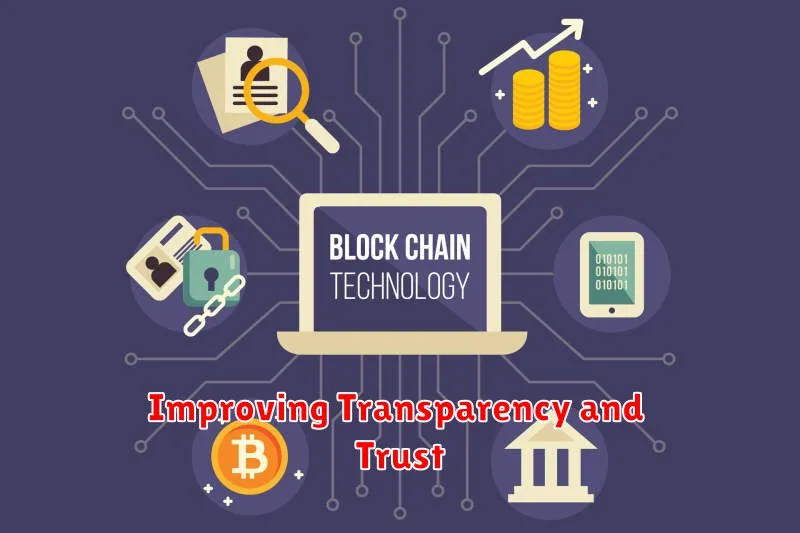In today’s rapidly evolving digital landscape, businesses are constantly seeking innovative solutions to enhance their operations and gain a competitive edge. Blockchain technology, with its decentralized and secure nature, offers a transformative potential for businesses across various industries. This article explores how integrating blockchain can revolutionize your business strategy, enabling enhanced security, transparency, and efficiency.
From streamlining supply chains and securing sensitive data to building trust with customers and optimizing internal processes, the applications of blockchain are vast and impactful. Discover how leveraging this groundbreaking technology can strengthen your business strategy, drive innovation, and unlock new opportunities for growth in the digital age. Learn about the key benefits of blockchain implementation and understand how it can address critical challenges facing businesses today.
Basics of Blockchain Technology
Blockchain technology is a shared, immutable ledger that facilitates the process of recording transactions and tracking assets in a business network. An asset can be tangible (a house, car, cash, land) or intangible (intellectual property, patents, copyrights, branding). Virtually anything of value can be tracked and traded on a blockchain network, reducing risk and cutting costs for all involved.
At its core, blockchain is a decentralized system. This means that no single entity controls it, making it transparent and secure. Information is recorded in “blocks” linked together chronologically forming a “chain.” Each block contains a cryptographic hash of the previous block, a timestamp, and transaction data. This structure makes it extremely difficult to alter past records, contributing to blockchain’s inherent security.
Blockchain Applications Beyond Cryptocurrency
While cryptocurrency brought blockchain into the public eye, its potential extends far beyond digital currencies. Businesses are exploring blockchain’s capabilities to enhance various aspects of their operations.
Supply chain management can benefit greatly from blockchain’s transparent and immutable ledger. Tracking products from origin to consumer builds trust and improves efficiency. This also allows for improved product recalls and combats counterfeiting.
Healthcare can leverage blockchain for secure storage and sharing of patient medical records. This ensures data integrity and streamlines access for authorized personnel, enhancing patient care.
Digital identity management becomes more robust with blockchain. Individuals can control and verify their digital identities securely, reducing fraud and simplifying online interactions.
Improving Transparency and Trust

Blockchain’s inherent structure fosters transparency and trust. Every transaction is recorded on a public, distributed ledger, making it virtually impossible to alter or delete information. This immutability creates a verifiable audit trail, enhancing accountability and reducing the potential for fraud.
For businesses, this translates to increased confidence among stakeholders. Customers can track the provenance of products, verifying their authenticity and origin. Partners can monitor transactions in real-time, ensuring compliance and streamlining processes. This heightened transparency cultivates trust, strengthening relationships and fostering long-term stability.
Blockchain for Secure Supply Chains
Blockchain technology offers a robust solution for enhancing supply chain security. Its decentralized and immutable ledger provides transparency and traceability throughout the entire process, from origin to consumer.
By recording every transaction on a shared, tamper-proof ledger, blockchain minimizes the risk of fraud and counterfeiting. This allows businesses to verify the authenticity of products and track their movement efficiently.
Improved data security is another key benefit. Blockchain’s cryptographic hashing and distributed ledger system make it extremely difficult for malicious actors to alter or delete information, protecting sensitive supply chain data from unauthorized access.
Reducing Fraud and Enhancing Security
Blockchain’s inherent security features can significantly reduce fraud and enhance security within your business operations. The decentralized and immutable nature of the blockchain makes it extremely difficult to tamper with data. Each transaction is cryptographically linked to the previous one, creating a permanent and auditable record.
This transparency and immutability minimizes the risk of fraudulent activities such as data manipulation or unauthorized access. Because records are distributed across multiple nodes, there is no single point of failure that attackers can exploit.
Smart Contracts and Automation
Smart contracts are self-executing contracts with the terms of the agreement directly written into code. They automatically enforce the agreed-upon conditions when predefined criteria are met, eliminating the need for intermediaries and reducing the risk of disputes. This automation streamlines processes, saving time and resources.
This automated execution facilitates faster transactions and significantly reduces operational costs. By replacing manual processes with automated smart contracts, businesses can improve efficiency and transparency.
Challenges of Blockchain Adoption
Despite its potential, blockchain adoption faces several hurdles. Scalability remains a key challenge, with some blockchains struggling to handle large transaction volumes efficiently. Interoperability between different blockchain networks is another significant obstacle, limiting seamless data exchange and collaboration.
Regulatory uncertainty poses a challenge for businesses looking to integrate blockchain. The evolving legal landscape surrounding cryptocurrencies and blockchain technology creates ambiguity and potential compliance risks. Furthermore, the technical complexity of blockchain can be daunting, requiring specialized expertise for development and implementation. Finding and retaining skilled blockchain developers is a common challenge.
Finally, integration with existing systems can be complex and costly. Legacy infrastructure may not be compatible with blockchain technology, requiring significant investment in upgrades and modifications.
Industries Leading in Blockchain Use
Several industries are at the forefront of blockchain adoption, leveraging its capabilities to transform operations and create new value. Supply chain management is a key area, using blockchain for enhanced traceability and transparency. The financial services sector is another prominent adopter, exploring blockchain for faster and more secure transactions, including cross-border payments and asset management.
Healthcare is also seeing significant blockchain implementation, focusing on secure data management and patient record sharing. Government agencies are exploring blockchain for applications such as digital identity and voting systems. Finally, the entertainment industry is using blockchain to manage digital rights and royalty payments.
Blockchain Case Studies and Success Stories
Examining real-world blockchain implementations provides valuable insights into its transformative potential. Supply chain management is one area significantly impacted. For instance, some companies use blockchain to track products from origin to consumer, enhancing transparency and accountability.
Financial services have also seen successful blockchain applications. Several institutions leverage blockchain for cross-border payments, reducing transaction times and costs. Furthermore, blockchain-based systems are being explored for secure record-keeping and identity verification.
Is Blockchain Right for Your Business?

Integrating blockchain technology is a significant decision, requiring careful consideration of your specific business needs and potential benefits. Evaluate whether blockchain aligns with your strategic objectives and offers tangible improvements over existing systems.
Key factors to consider include the need for enhanced security, data integrity, transparency, and automation. Blockchain is particularly well-suited for businesses handling sensitive data, managing complex supply chains, or seeking to streamline operations.
Assess the potential costs and complexities of implementation. While blockchain offers numerous advantages, it can be resource-intensive, requiring specialized expertise and infrastructure. Determine if the potential return on investment justifies the initial outlay and ongoing maintenance.

